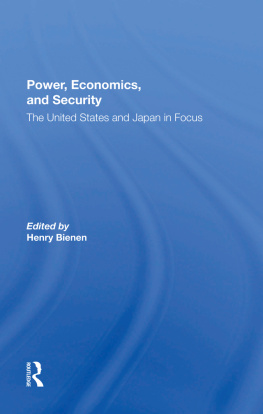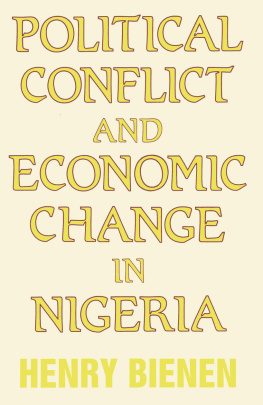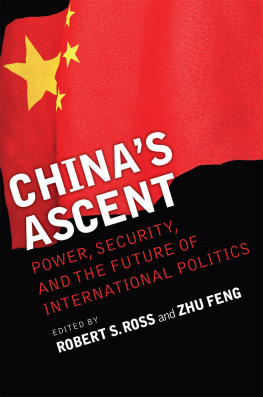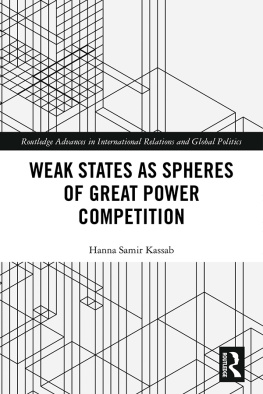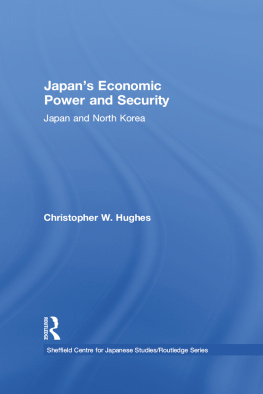Power, Economics, and Security
Pew Studies in Economics and Security
Series Editors
Crauford D. Goodwin
and Jim Leitzel, Duke University
Power, Economics, and Security:
The United States and Japan in Focus,
edited by Henry Bienen
Forthcoming
The Macroeconomic Dimensions
of Arms Reduction,
edited by F. Gerard Adams
Economics and National Security,
edited by Jim Leitzel
Incentives in Procurement Contracting,
edited by Jim Leitzel and Jean Tirole
Coping with Complexity
in the International System,
edited by Jack Snyder and Robert Jervis
Funded by
The Pew Charitable Trusts
Through the Program for
Integrating Economics and National Security
Written under
the auspices of the
Center of International Studies
Power, Economics, and Security
The United States and Japan in Focus
Edited by
Henry Bienen
To the memory of Klaus E. Knorr
First published 1992 by Westview Press
Published 2019 by Routledge
52 Vanderbilt Avenue, New York, NY 10017
2 Park Square, Milton Park, Abingdon, Oxon OX14 4RN
Routledge is an imprint of the Taylor & Francis Group, an informa business
Copyright 1992 by Taylor & Francis
All rights reserved. No part of this book may be reprinted or reproduced or utilised in any form or by any electronic, mechanical, or other means, now known or hereafter invented, including photocopying and recording, or in any information storage or retrieval system, without permission in writing from the publishers.
Notice:
Product or corporate names may be trademarks or registered trademarks, and are used only for identification and explanation without intent to infringe.
Library of Congress Cataloging-in-Publication Data
Power, economics, and security: the United States and Japan in focus
/ edited by Henry Bienen
p. cm. (Pew studies in economics and security)
Includes index.
ISBN 0-8133-8438-9
1. United StatesRelationsJapan. 2. JapanRelationsUnited
States. I. Bienen. Henry S. II. Series.
E183.8J3P69 1992
303.48'273052dc20 92-5894
CIP
ISBN 13: 978-0-367-28408-4 (hbk)
Contents
- PART ONE
ECONOMIC EFFECTS ON NATIONAL AND INTERNATIONAL SECURITY - PART TWO
JAPAN AND THE UNITED STATES IN THE GLOBAL ECONOMY
- PART ONE
ECONOMIC EFFECTS ON NATIONAL AND INTERNATIONAL SECURITY - PART TWO
JAPAN AND THE UNITED STATES IN THE GLOBAL ECONOMY
Guide
This volume is dedicated to the memory of Klaus E. Knorr, This is fitting for a number of reasons. The collaborative work here was done under the auspices of the Center of International Studies at Princeton University, which Klaus Knorr directed from 1961 until 1968. The concerns of this book are to analyze the relationships among economic and military power and national security; to explore the ways economic power and economic decline relate to international hegemony; and to examine our understanding of concepts such as power, security, and burden-sharing. These concerns ranked high on Klaus Knorr's research agenda during his productive and fruitful life.
The second chapter, "An Intellectual Remembrance of Klaus Knorr," by Richard Betts, Michael Doyle, and G. John Ikenberry, details the themes that absorbed Knorr's interest and describes how he analyzed the relationships that occupy us here. For Knorr, the tendencies to misunderstand both the uses and the bases of military power were major preoccupations. We are fortunate that Knorr's last major writing effort revisited the issue of the determinants of military power, and his long chapter on this issue is published here. The chapter is vintage Knorr in that although he explores in detail the determinants of military power, he also examines the changes in the international system that in turn alter both the bases of military power and the significance of that power.
Much of this volume is devoted to the changing relationship between the United States and Japan. The focus of Knorr's research was more on Europe and the United States, but he by no means ignored Japan because he was a voracious reader of history; his early work dealt with access to resourcesa Japanese preoccupation. Moreover, Knorr was well aware of the growing importance of the Pacific Basin and of the theories that argued that Japan had benefitted relatively from the huge defense expenditures of the United States and the Soviet Union that hindered the economic growth of those countries. Knorr did not accept all the arguments of what have come to be known as the "decline theorists" and of those who have argued that overextension of commitments has been an important component of economic and later political and international decline, but he took the arguments seriously.
A number of the authors who have entered this debate are represented in this volume, although their chapters do not always deal directly with the decline and overextension argument. The work of Robert Gilpin, Aaron L. Friedberg, Michael Doyle, David A. Baldwin, Kenneth B. Pyle, Charles A. Kupchan, and Helen V. Milner has been important work indeed, and their chapters here sometimes extend the debate and always explore the changing relationships among economics and national security, legitimacy and power, and the meanings of security.
Klaus Knorr encouraged younger scholars and believed it was a critical role of universities and research centers to bring new blood to the study of international relations. We are pleased that the generous support of the Few Charitable Trusts allowed the Center of International Studies to engage junior as well as senior scholars in our effort to discuss the complexities of power and security. Furthermore, a number of these younger scholars are Japanese. Although there is not something that can be called a Japanese or a U.S. perspective, it is important to hear different voices and analyses that may utilize different sources and perspectives.
We are very grateful to the Pew Charitable Trusts, which took on one of the most ambitious social science undertakings in U.S. history when it brought economists and political scientists together to reflect on the interaction of political and economic factors in national security. Other volumes emerging from the Pew economics and national security sponsorship deal with economic approaches to thinking about security. Here we use conventional political economy approaches, including ones pioneered by Klaus Knorr, to engage again issues of power and national security.
We thank the president of the Pew Charitable Trusts, Dr. Thomas Langfitt, for his support of this effort. James McGann, Kevin Quigley, and Dan McIntyre of Pew and many colleagues from academic and research institutions participated in important ways to make this study possible. Thanks go to them. At Princeton University, Jerri Kavanagh was, as always, instrumental in helping us get our work completed.
Henry Bienen
David A. Baldwin is the Ira D. Wallach Professor of World Order Studies and director of the Institute of War and Peace Studies at Columbia University. His recent books include Paradoxes of Power and Economic Statecraft.
Richard Betts , professor of political science at Columbia University, is author of Surprise Attack (1982), Nuclear Blackmail and Nuclear Balance (1987), and Soldiers, Statesmen and Cold War Crisis, second edition (1991).

